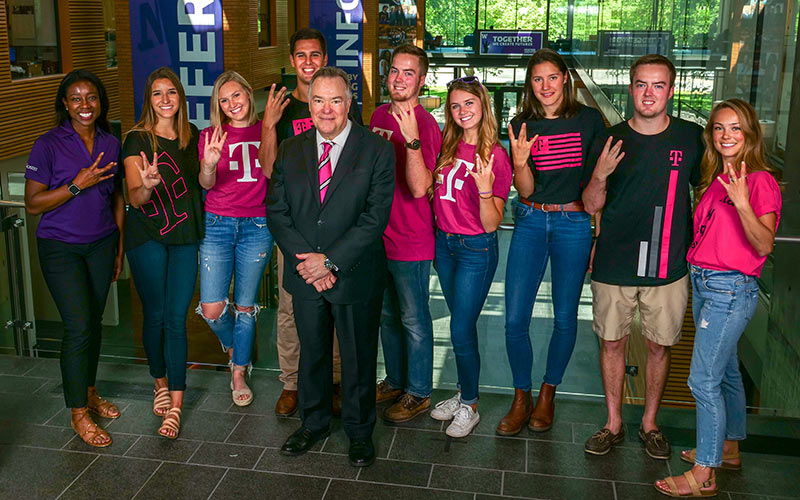Tech industry’s favorite B-School for MBA recruitment: Foster

According to Poets & Quants, the Foster School of Business tops all others as the tech industry’s favorite B-School. Ninety-nine percent of Foster MBAs secured jobs within 3 months of graduation—the highest rate in the U.S.—and 60% of them accepted positions at tech companies including Amazon, Apple, Dropbox, Expedia, Facebook, Google, Intel, Microsoft, Salesforce, Tableau, T-Mobile, and Verizon. Another 16% chose positions in the consulting industry where Foster MBAs were hired by firms such as Accenture, CBRE, Deloitte Consulting, KPMG, McKinsey & Company, Point B, and PricewaterhouseCoopers (PWC).
Across industries, Foster 2018 graduates earned an average salary and bonus of $147,763 (up from $133,299 in 2017) and carried the lowest debt among top 25 schools.
#9 for total MBA earnings
When total MBA earnings include average bonuses, stock options, and moving expenses, the Foster School of Business rises to #9 of the top 50 schools ranked in U.S. News & World Report. The analysis of average 2017 total MBA compensation by Poets & Quants shows an aggregate of average salary, bonus, and other compensation reported for U.S. News’ 2019 Best Business Schools Rankings.
Foster graduates were especially competitive with their elite peers for average bonuses, which increased $10,000 from the previous year. More than 75% of Foster MBAs received a bonus averaging $31,570 and other compensation averaging $25,462. Added to salary, Foster grads’ average total 2017 MBA earnings of $177,936 surpassed Dartmouth, Michigan, Virginia, Berkeley, UCLA, Cornell, and Yale.
A magnet for innovative companies
Since 2014, Foster’s tech placement has turbocharged 19 full percentage points from 41% to 60% for 2018’s graduating class. Naomi Sanchez, assistant dean of MBA Career Management describes the attraction between tech companies and Foster MBAs to Nathan Allen of Poets & Quants. “I think MBAs are looking for companies that have breakthrough business models that are changing life,” says Sanchez. “They like the idea of innovation and creativity. They want to work for an exciting, cutting-edge type of situation, with smart people. They want to be surrounded by this energy.”
To prepare Foster MBAs for success in fast-moving companies, the Foster MBA curriculum emphasizes recent technology innovations in research, teaching, and practice. Faculty and alumni professionals share their expertise in technology topics, from e-commerce to machine learning and artificial intelligence; equipping graduates with a strategic view of technology’s role in business.
Hiring firms partner in MBA professional development
To complement high-demand hard skills such as finance, SQL, Excel, and Tableau, Foster MBAs learn essential collaboration and communication skills directly from top companies. According to Sanchez, McKinsey, BCG, and Bain Consulting provide training in radical collaboration, training students in critical thinking and framework thinking around a case-prompt question. Students meet in teams, collaborate, and present their ideation to the companies. And Amazon teaches MBAs critical skills in business memo writing.
Why are these softer skills so important? Sanchez explains that “Delegating and influencing without authority is huge in these matrix organizations — cross-departmental influence where you’ve got to have some way to make things happen without supervision.”
Foster has three employer advisory boards that provide insight and resources to enhance the partnership between the MBA program and employers. Made up of business leaders in Seattle, the Bay Area, and Pacific Asia Region, employer advisory boards include iconic companies like Amazon, Deloitte, Google, Microsoft, Nordstrom, Starbucks, and more.
Learn more about the Full-time MBA Program
Related stories:
Financial Times ranks Foster #1 in U.S. for MBA jobs, #7 in world for research
Businessweek ranks Foster #16 of Best Business Schools in the U.S.
Foster rises 14 spots to #22 in the world in Economist Which MBA Ranking
